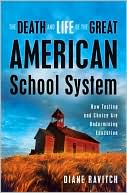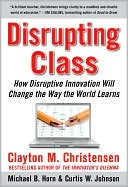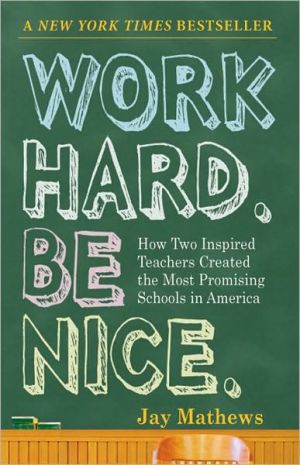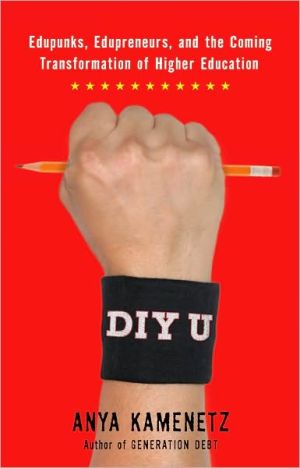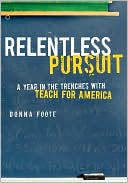One Day, All Children. . .: The Unlikely Triumph of Teach for America and What I Learned along the Way
From her dorm room at Princeton University, twenty-one-year-old college senior Wendy Kopp decided to launch a movement to improve public education in America. In One Day, All Children... , she shares the remarkable story of Teach For America, a non-profit organization that sends outstanding college graduates to teach for two years in the most under-resourced urban and rural public schools in America. The astonishing success of the program has proven it possible for children in low-income...
Search in google:
The inspiring story of one young activist's visionary effort to revitalize our nation's neediest schools Publishers Weekly "If at the time I had understood the importance of ensuring the necessary funds before moving forward with new ideas, Teach for America would never have been born in the first place," writes Kopp in this impassioned account of how what started 10 years ago as her bold college thesis has become a pioneering educational program . Her plan to create a national teacher corps by recruiting top college graduates to work in the neediest school districts across the U.S. led to the development of a solidly financed nonprofit organization that has placed more than 5,000 teachers, many of whom have achieved extraordinary academic results. But Kopp's primary aim in this frank, winning and well-timed book is to share what she's learned about bringing underprivileged and underperforming students up to par. For example, she argues that just giving them the same resources that privileged students have is not enough; teachers and administrators need to put in the extra time it takes to change these students' attitudes about their own capability for achieving success. When it comes to structuring and managing schools, she asserts that schools should recruit teachers from a variety of disciplines not just those with degrees in education give them the support they need, pay them well and encourage them to push their students to fulfill their highest potential, which is often far beyond any arbitrary measure of achievement. As an outsider, Kopp has brought a fresh approach to the educational process that has proved effective; her inspiring story will challenge schools and professional educators to take notice, while motivating college seniors and recent graduates to join her team. (Apr.) Copyright 2001 Cahners Business Information.
\ \ \ \ \ Chapter One\ \ \ The Thesis\ \ \ It was in October of my senior year at Princeton that I realized I needed a plan. What was I going to do after graduation? To this point my life had always been driven toward some academic or extracurricular goal. But now, as I grappled with the biggest decision of my first twenty-one years, I had no idea what I wanted to do. I felt uninspired. I was searching for a place to direct my energy that would give me the kind of significant responsibility that I had enjoyed in various student organizations. I wanted this opportunity right away, not ten or twenty years down the road. More important, I wanted to do something that would make a real difference in the world. I just didn't know what that was.\ The issue of my future weighed on me all my waking hours, beginning with my early morning runs. Jogging used to bring me clarity, but now as I ran around the town of Princeton, I felt only more lost. My frustration grew. It became a nagging inner monologue that followed me as I walked across campus between classes or tried to listen to lectures or headed over to Nassau Street, where I would grab lunch and dinner since I'd never found my niche among Princeton's eating clubs. I was in a funk.\ This was 1988, and I was a member of the Me Generation. At least that's what the media said. If you believed the pundits, all my generation cared about was making money and leading pampered lives.\ It did seem that just about every Princeton senior was applying to a two-year corporate training program, most with investment banks andmanagementconsulting firms. Yet something seemed wrong to me about that "Me Generation" label. Most of the people I knew weren't heading to these two-year programs because they were dead set on making money. Most weren't doing so out of a deep interest in business or high finance either. They just couldn't think of anything else to do. I sensed that I was not alone—that there were thousands of other seniors like me who were searching for jobs that would offer them significance and meaning.\ At the same time that I soul-searched about my future, I found myself increasingly engrossed in another issue: the failures of our public education system. This issue had first captured my attention as a college freshman. My roommate, who had attended public school in the South Bronx, was smart and creative. She was a brilliant poet. Still, she struggled under the academic demands of Princeton.\ I had attended public schools in an upper-middle-class community in Dallas. My schools were not typical. For starters, they had money to spare. Lots of it. A $100,000 scoreboard hung above the $3 million football stadium with Astroturf that cost $1 million every three years to replace. The student body was almost completely homogenous, racially as well as socioeconomically. More than 99 percent of the 300 or 400 incoming freshmen would graduate, and about 97 percent would go on to college. Because of the high quality of my schools and the support provided by my family and community, I graduated with an education so solid that I was able to do well at Princeton without locking myself into solitary confinement at Firestone Library.\ As I moved through Princeton, I grew increasingly aware of students' unequal access to the kind of educational excellence I had previously taken for granted. I wanted to figure out what could be done about this problem, and so I organized a conference about the issue. At this time I led an organization called the Foundation for Student Communication. Run entirely by Princeton students, it was designed to bring student leaders and business leaders together to discuss pressing social issues. So in November of my senior year, my colleagues and I gathered together fifty students and business leaders from across the country to propose action plans for improving our education system.\ There were many interesting discussions and debates, but one in particular stuck out. In a session about teacher quality, nearly all of the student participants—who had been chosen through a rigorous application process and were certainly among the nation's more talented students—said that they would teach in public schools if it were possible for them to do so. And one speaker maintained that people without education degrees were frequently hired by public schools because there weren't enough education majors interested in teaching in low-income communities.\ At one point during a discussion group, after hearing yet another student express interest in teaching, I had a sudden idea: Why didn't this country have a national teacher corps of recent college graduates who would commit two years to teach in urban and rural public schools? A teacher corps would provide another option to the two-year corporate training programs and grad schools. It would speak to all of us college seniors who were searching for something meaningful to do with our lives. We would jump at the chance to be part of something that brought thousands of our peers together to address the inequities in our country and to assume immediate and full responsibility for the education of a class of students. I suggested the idea in a discussion group; others responded enthusiastically.\ The more I thought about it, the more convinced I became that this simple idea was potentially very powerful. If top recent college graduates devoted two years to teaching in public schools, they could have a real impact on the lives of disadvantaged kids. Because they had themselves excelled academically, they would be relentless in their efforts to ensure their students achieved. They would throw themselves into their jobs, working investment-banking hours in classrooms instead of skyscrapers on Wall Street. They would question the way things are and fight to do what was right for children.\ Beyond influencing kids' lives directly, a national teacher corps could produce a change in the very consciousness of our country. The corps members' teaching experiences were bound to strengthen their commitment to children in low-income communities and spur their outrage at the circumstances preventing these children from fulfilling their potential. Many corps members would decide to stay in the field of education. And those who would become doctors and lawyers and businesspeople would remain advocates for social change and education reform. They would become school board members. They would become mayors and state legislators, U.S. senators and Supreme Court justices. And they would make better decisions because of their experience teaching in public schools.\ Now during my morning runs and campus walks, I would roll the idea of the teacher corps over and over in my head. This could be huge, I thought. This could be the Peace Corps of the 1990s: Thousands would join, and we would fundamentally impact our country.\ As I became increasingly excited about the idea of a national teacher corps, I was still trying to figure out a practical answer to my own uninspired job search. Teaching just might be it, I thought. I went to the career services office. They referred me to the teacher preparation office, which helped ten to twenty Princeton students attain teacher licensure each year. It was too late for me to enter this program, but the office pointed me to a file cabinet stuffed with job applications and certification requirements from school districts across the country. The files were a mess of mismatched, multicolored, jargon-filled papers.\ Overwhelmed by all the information and completely confused about whether I could actually teach without an education degree, I decided to call the New York City public schools directly. I spoke with a former teacher who was working to recruit recent graduates of East Coast colleges to teach in New York. He told me that if I could wait until Labor Day, I would probably get a teaching job. The schools couldn't be sure of their job openings until then. This was a major disappointment. I needed money to live on right after I graduated.\ Although this whole experience was initially discouraging, it turned out to be a good thing. In the end, it only made me more convinced of the need for a teacher corps that would recruit as aggressively as the investment banks and management consulting firms that were still swarming all over campus. The teacher corps would make teaching an attractive choice for top grads by surrounding it with an aura of status and selectivity, streamlining the process of applying for teaching positions, and assuring recent graduates a job and a steady income despite districts' inability to hire them until Labor Day.\ I became so obsessed by the idea that I decided to try to make it happen. I wrote a letter to President George Bush suggesting that as the "Education President," he should create this new corps. John Kennedy had set up the Peace Corps, I thought. Who better than the President of the United States to create the teacher corps? With high hopes, I mailed off my impassioned letter. It must have slipped into the wrong stack. In return I received a form letter rejecting my application for a job.\ At some point in December, I saw that I simply needed a job—a job that would pay my bills after graduation. So I made a weak attempt, applying for a total of five positions—one at an investment bank, two at consulting firms, one at a food products company, and one at a commercial real estate venture.\ And I began musing about another possibility. If the President wasn't going to create a teacher corps, maybe I could start one as a nonprofit organization. My experience at the Foundation for Student Communication, where I managed a staff of sixty and sold hundreds of thousands of dollars' worth of magazine advertisements and conference sponsorships, made me think that I just might be able to pull this off. More important, I didn't have the experience to see why it couldn't be done.\ Meanwhile, as a senior at Princeton, I was obligated to write a thesis. I had been looking for a topic that would grab me, that would inspire me to spend hours and hours researching and writing. After the education conference, I knew that the teacher corps idea was my answer. Here was something that motivated me personally and that would also satisfy my requirements at the Woodrow Wilson School, Princeton's public policy program.\ And so, during the spring of my senior year, I withdrew from the world—skipping whatever classes I could and talking to just about no one—in order to research the viability of a national teacher corps. I was certain such a corps must already exist somewhere—it was too obvious!—or that there was some reason it wouldn't work.\ I couldn't find one. Just as the conference speaker had told us, even in times of general teacher surplus there is always a shortage of qualified teachers in very low-income areas. Individuals who haven't majored in education are hired to meet the need in underprivileged areas. And although there were a number of initiatives to improve the recruitment of new teachers, there was no national teacher corps. I also researched potential models—the Peace Corps, the teacher corps that had been run by the federal government in the 1960s, and alternative certification programs that existed in certain states to ease people without traditional teacher certification into teaching.\ As I wrote my thesis, I became all the more determined to make this idea a reality. Thankfully, the firms to which I was applying for more conventional jobs made my choice easier. I didn't get a single offer. I remember standing at a pay phone at school, hearing the Morgan Stanley recruiter—my last remaining corporate possibility—tell me that they had decided I wasn't the right fit for the firm. I took this rejection personally, but I figured it must have happened for a good reason. The moment I hung up, I made my decision. I would start the teacher corps.\ In the end, I produced "A Plan and Argument for the Creation of a National Teacher Corps," which looked at the educational needs in urban and rural areas, the growing idealism and spirit of service among college students, and the interest of the philanthropic sector in improving education. The thesis presented an ambitious plan: In our first year, the corps would inspire thousands of graduating college seniors to apply. We would then select, train, and place five hundred of them as teachers in five or six urban and rural areas across the country. According to the budget calculations I had done, this would cost approximately $2.5 million.\ I knew we had to start big. Only a monumental launch would convey the urgency and national importance of our effort. And only that would inspire the nation's most talented graduating seniors—those with the most attractive career options—to forgo other opportunities to be part of this movement. I found support for this plan in my research about the Peace Corps. President Kennedy had appointed Sargent Shriver to develop a proposal for the Peace Corps, and most of Shriver's advisers suggested a cautious beginning. But Shriver knew that a corps that proceeded gradually would never become a symbol of the New Frontier. And so Shriver recommended that Kennedy create the Peace Corps by executive order, that it be launched within weeks, and that several hundred volunteers be placed within the year. Shriver's plan led thousands of idealistic college students to apply, and it ensured the Peace Corps's place as an enduring part of the American landscape. His theory worked for the Peace Corps. I was sure it would work for the teacher corps.\ \ \ In early April of 1989, a week before my thesis was due, I called Marvin Bressler, then chairman of Princeton's sociology department. Professor Bressler had agreed to be my thesis adviser on the condition that I make an argument for mandatory national service. I accepted the condition because, as the last senior in my department to decide on a thesis topic, I didn't have much choice. I had tried to convince Professor Bressler of what I thought to be the brilliance of my idea, but he said I couldn't write a thesis on something that amounted to little more than an advertising campaign for teachers. I was banking on Professor Bressler's forgetting his stipulation. So instead of telling him what I was really writing about, I steered clear of him until the last minute.\ When I finally called Professor Bressler one week before the due date, I wasn't sure if he would even remember agreeing to be my adviser. So I reminded him that I was the student proposing a national teacher corps and then told him that I had completed a draft of the thesis. "I've actually decided to start the corps," I told him. He suggested I drop the draft off. I did. Two days later he called to ask me to stop by his office.\ I walked across campus, terrified of what this brilliant, opinionated man would think of my paper and, more than anything, worried that he might insist I revise it. Would he force me to make a pitch for mandatory national service?\ Professor Bressler quickly put my fears to rest. What he really wanted to know, he said in his booming voice, was how in the world I planned to raise the $2.5 million. I told him I was positive Ross Perot would help. Having grown up in Dallas when Mr. Perot had led a campaign to improve Texas schools, I was certain he would love my idea. And given his own background, surely he would relate to something so entrepreneurial. "He's from Dallas, and I'm from Dallas, and he's really into education reform," I said.\ Professor Bressler leaned back, contemplating my answer. He didn't seem convinced. "Do you know how hard it is to raise twenty-five hundred dollars?" he asked. He arranged for me to meet with Princeton's director of development, who could fill me in on just how difficult it would be.
AcknowledgmentsixPrefacexi1The Thesis32Suspending the Laws of the Universe133When Idealism Isn't Enough494New Ideas735The Dark Years776Big Decisions1037Reaching the Light at the End of the Tunnel1158Upward Spiral1279Taking Stock14710Realizing the Vision15711The Decade Ahead181Afterword187
\ Publishers Weekly - Publisher's Weekly\ "If at the time I had understood the importance of ensuring the necessary funds before moving forward with new ideas, Teach for America would never have been born in the first place," writes Kopp in this impassioned account of how what started 10 years ago as her bold college thesis has become a pioneering educational program . Her plan to create a national teacher corps by recruiting top college graduates to work in the neediest school districts across the U.S. led to the development of a solidly financed nonprofit organization that has placed more than 5,000 teachers, many of whom have achieved extraordinary academic results. But Kopp's primary aim in this frank, winning and well-timed book is to share what she's learned about bringing underprivileged and underperforming students up to par. For example, she argues that just giving them the same resources that privileged students have is not enough; teachers and administrators need to put in the extra time it takes to change these students' attitudes about their own capability for achieving success. When it comes to structuring and managing schools, she asserts that schools should recruit teachers from a variety of disciplines not just those with degrees in education give them the support they need, pay them well and encourage them to push their students to fulfill their highest potential, which is often far beyond any arbitrary measure of achievement. As an outsider, Kopp has brought a fresh approach to the educational process that has proved effective; her inspiring story will challenge schools and professional educators to take notice, while motivating college seniors and recent graduates to join her team. (Apr.) Copyright 2001 Cahners Business Information.\ \ \ \ \ Library JournalKopp's dream as a college senior ten years ago was to commit two years to teaching at a public school in a low-income urban or rural area. She turned this seeming pipe dream into reality by mobilizing members of her generation to form a corps of graduates called Teach for America (TFA). Since 1990, some 5000 TFA members have been placed into teaching positions in 13 states, drawing high praise from participating communities. In this revealing account, Kopp invites the reader to learn what it took to overcome the endless challenges while describing some of the most difficult as well as funniest moments from the past ten years. This kind of accomplishment rarely adequately celebrated proves that excellence is possible. Recommended for all collections on education reform as well as volunteer movements. Leroy Hommerding, Fort Myers Beach P.L., FL Copyright 2001 Cahners Business Information.\ \ \ BooknewsSince its inception in 1990, the Teach for America program has placed recent college graduates in two year teaching positions in low income and rural areas. In this text, Wendy Kopp, the program's founder, recounts her experiences from developing the initial idea during her senior year at Princeton, through struggles to keep the program going and Teach for America's current successes. The volume does not contain an index or bibliographical references. Annotation c. Book News, Inc., Portland, OR (booknews.com)\ \

